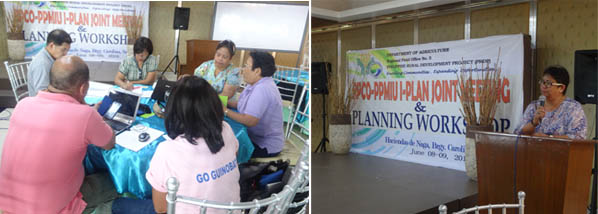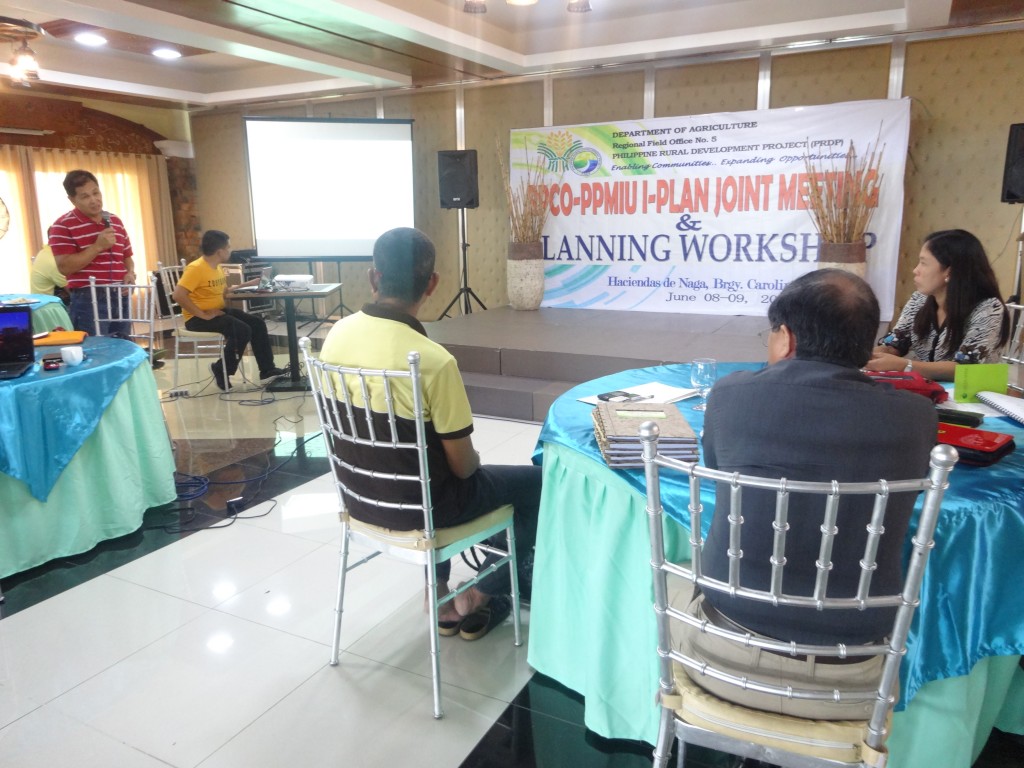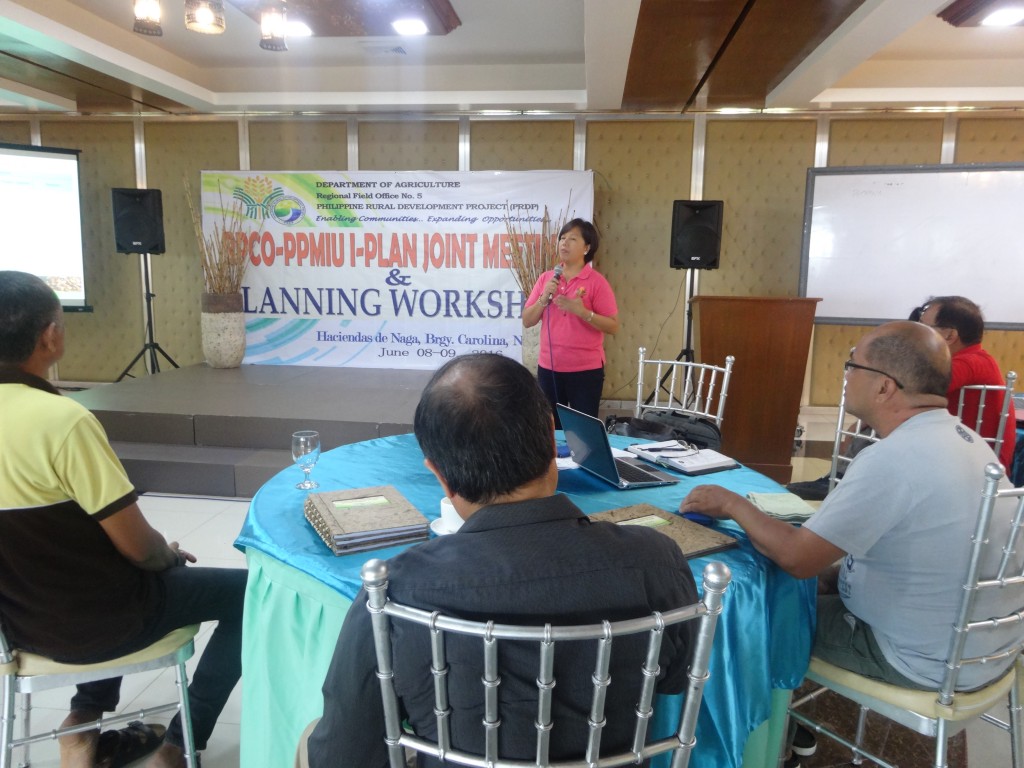 PRDP-Bicol I-PLAN Component Head Aloha Gigi I. Bañaria expresses her gratitude to the representatives of DA’s partner agencies and regular programs for their support in mainstreaming the PCIPs in their respective plans and programs.
PRDP-Bicol I-PLAN Component Head Aloha Gigi I. Bañaria expresses her gratitude to the representatives of DA’s partner agencies and regular programs for their support in mainstreaming the PCIPs in their respective plans and programs. DA-Bicol’s partner agencies commit to support PRDP commodity investment plans
June 13, 2016
The Department of Agriculture’s partner agencies commit to support the Provincial Commodity Investment Plans (PCIPs) under Philippine Rural Development Project (PRDP) in Bicol during a joint meeting and planning workshop held on June 8-9, 2016 in Naga City. The activity aims to integrate the DA-PRDP’s PCIPs with banner programs of DA and other government agencies.
Representatives from the Provincial Project Management and Implementation Unit (PPMIU) of Albay, Camarines Sur, Camarines Norte, Sorsogon and Catanduanes as well as the City Project Management and Implementation Unit (CPMIU) of Naga City attended the said activity. It was also participated by staff from the Department of Agriculture (DA) regular programs and its partner agencies like the Department of Science and Technology (DOST), Philippine Fiber Industry Development Authority (PhilFIDA), Philippine Coconut Authority (PCA) and Bureau of Fisheries and Aquatic Resources (BFAR).
The crafting of the PCIP is based on the value chain analysis (VCA) of the commodities which identifies the development gaps and required interventions for each of the priority commodities. Each province presented and discussed the on-going interventions of their priority commodities. Constraints to commodity development were also identified, together with the potential solutions that the concerned partner agencies can commit.
Romeo S. Aquino of PPMIU-Catanduanes presented the PCIP for mangrove crab and abaca as their priority commodities, giving stress on the constraints on mechanization of abaca “pinukpok” processing and the need for training on crab farming.
DOST Region V Director Tomas Briñas recommended conducting stakeholders’ consultation to conceptualize programs that will boost the abaca industry in the province. He also suggested using the automated hand loom and value-adding abaca raw products.
“Potential of abaca is very high but we still need to coordinate with the abaca stakeholders to come up with a program that would help improve the industry of abaca,” he said.
Meanwhile, PhilFIDA Officer Lorgen Z. Garcia confirms that a one-hectare open type high density abaca nursery will be established in Gigmoto, Catanduanes this year. To support the mangrove crab industry in Catanduanes, Irene P. Daet of BFAR said that they can provide trainings on crab farming.
On the other hand, Percival de Villa, I-PLAN Component Head of PPMIU of Albay, presented the PCIPs for coco geonets and sweet potato.
Briñas underscored the need to establish the quality management system for coco geonets. He noted some coco geonet weavers’ failure to produce quality products despite their efforts to provide equipment like procuring weaving machine as well as decorticating and drying machines. He also announced that the DOST will soon establish a coconut technology hub to maximize the various uses of coconut.
In addition, he said that there will be an increase in food processing for sweet potato as DOST will pioneer a food innovation center in Bicol University.
Amalia I. Cañamero of PPMIU-Camarines Norte also discussed the PCIP for cocogeonets and pineapple. She cited the need for more trainings and seminars on how to utilize the coconut husk as well as technical assistance and training for the packaging and nutrient analysis for pineapple juice.
To address the constraints discussed, Briñas said that they should clearly identify the trainings needed for a particular kind of product and process. As for pineapple, Briñas advised the PPMIU to conduct soil suitability analysis before planting to avoid “batterballs” or small pineapples.
Engr. Argeme J. Gregorio of PPMIU-Sorsogon highlighted pili and seaweed as their commodities. She mentioned the problem on poor packaging for pili products, low mobility at sea, and lack of nursery management trainings.
DOST committed to provide training and seminars on sealing technology on pili products while BFAR informed PPMIU-Sorsogon that they also give motorized and non-motorized boats upon request. BFAR also offers trainings to guarantee seaweeds’ sustainability.
Ma. Teresa O. Asido of PPMIU-Camarines Sur discussed the PCIPs for cassava and coco sap sugar. Edmundo R. Bailon of PCA assured to conduct a training to resolve the issue on poor packaging and other concerns related to coco sap.
Moreover, the CPMIU of Naga City presented the PCIP for pili nut candies. According to Norman Posugac, the main problem that they are now facing is the poor quality of pili products, lack of technical know-how on pili processing and inadequate equipment to produce export-quality pili nut products. Likewise, DOST committed to help them address the said issues.
PCIP is a three-year rolling consensus plan between the DA and LGU that serves as basis in determining PRDP interventions and eligible sub-projects under the Project’s infrastructure development (I-BUILD) and enterprise development (I-REAP) components.
PRDP is a six-year project under the DA, jointly funded by the World Bank and the LGUs that aims to establish a modern, inclusive, value chain oriented and climate-resilient agriculture and fisheries sector. (Annielyn L. Baleza and Michelle Angela G. Alfigura, DA-PRDP RPCO V InfoACE Unit)

Romeo S. Aquino (in red) of PPMIU-Catanduanes presents the PCIPs for mangrove crab and abaca to the representatives of DA regular programs and partner agencies.

